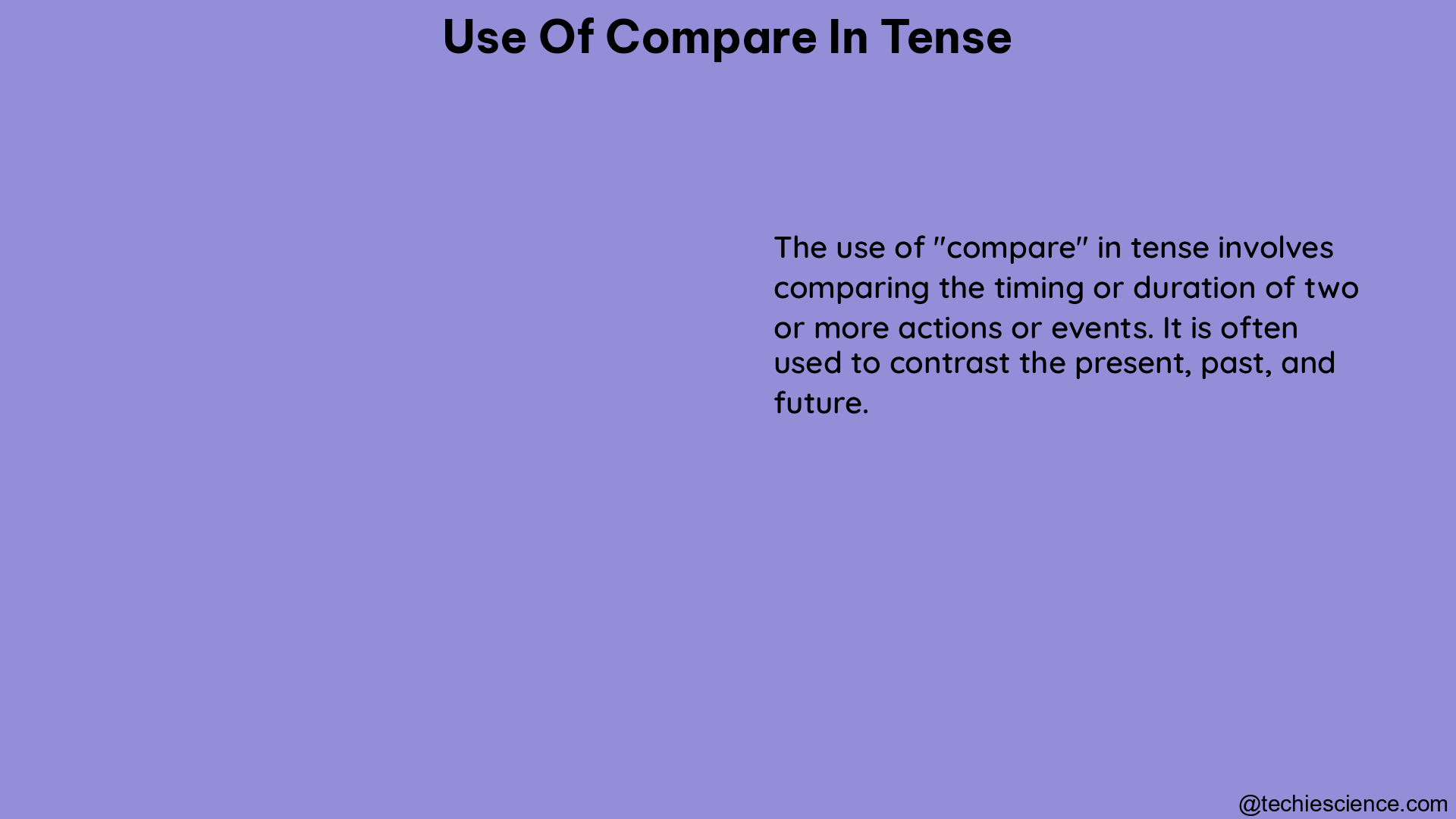The use of “compare” in tense involves understanding the nuances of comparative structures in different grammatical tenses. This comprehensive guide will delve into the specifics of using “compare” in present, past, and other tenses, providing a wealth of examples and references to help you navigate this crucial aspect of English grammar.
Present Tense Comparisons
Basic Comparison Pattern
When making comparisons in the present tense, the basic structure is to use the present tense of the verb “to be” (is, are) followed by a comparative adjective and the word “than.”
Example:
– “This book is more interesting than the other one.”
Equal Comparisons
To indicate equality in a present tense comparison, use the word “as” instead of “than.”
Example:
– “Her cooking is as delicious as my mother’s.”
Past Tense Comparisons

Basic Comparison Pattern
In the past tense, the structure is to use the past tense of the verb “to be” (was, were) followed by a comparative adjective and “than.”
Example:
– “The book was better than the movie.”
Equal Comparisons
Similar to the present tense, use “as” instead of “than” to indicate equality in a past tense comparison.
Example:
– “Your cooking was as delicious as my mother’s.”
Comparing Past and Present
To compare a current situation with a past one, use the phrase “than it used to be.”
Example:
– “The city is safer than it used to be.”
Advanced Comparison Structures
Comparative Adverbs
In addition to comparative adjectives, you can also use comparative adverbs to make comparisons.
Example:
– “She runs more quickly than her sister.”
Irregular Comparatives
Some adjectives and adverbs have irregular comparative forms that do not follow the standard “-er” or “more/less” patterns.
Examples:
– Good/Better, Bad/Worse, Much/More, Little/Less
Superlative Comparisons
To indicate the highest or lowest degree of a quality, use the superlative form of the adjective or adverb.
Examples:
– “This is the best book I’ve ever read.”
– “She runs the fastest in our group.”
Common Errors and Considerations
Consistency in Tense
Maintaining consistency in tense is crucial, especially in compare and contrast essays. Avoid switching between present and past tense when making comparisons.
Using the Correct Comparative Form
Ensure that you use the proper comparative form, such as “faster” instead of “more faster.”
Avoiding Ambiguous Comparisons
Clarify the comparison to avoid ambiguity. For example, “She likes pizza better than her husband” could mean either “She likes pizza better than her husband likes it” or “She likes pizza better than her husband does.”
Examples and References
Reddit Discussion
A discussion on the Reddit r/grammar subreddit explores the use of tense in compare and contrast essays, emphasizing the importance of consistency and context.
Link: Tense used in a compare and contrast essay
Stack Exchange Questions
The English Language Learners Stack Exchange site features questions on the use of “compared to” vs. “comparing to” and the appropriate tense when comparing a dead and a living person.
Links:
– Compared to or comparing to
– Which tense should be used while comparing one dead and one living person using “compared to”?
Walden University Guide
The Walden University Writing Center provides a comprehensive guide to comparisons, including common errors and examples of comparative structures.
Link: Comparisons
YouTube Video
For a visual explanation, this YouTube video covers the basics of creating past tense comparisons, including the standard patterns and equal comparisons.
Link: How to Make Past Tense Comparisons
References:
– https://ell.stackexchange.com/questions/113706/compared-to-or-comparing-to
– https://www.reddit.com/r/grammar/comments/1168eke/tense_used_in_a_compare_and_contrast_essay/
– https://english.stackexchange.com/questions/320585/which-tense-should-be-used-while-comparing-one-dead-and-one-living-person-using
– https://academicguides.waldenu.edu/writingcenter/grammar/comparisons
– https://www.youtube.com/watch?v=AjnokhduS0A

Hi…. I am Goutam Datta. I have completed a double M. A. in English and B. Ed. I am a creative writer. Currently, I am a part of the LambdaGeeks.